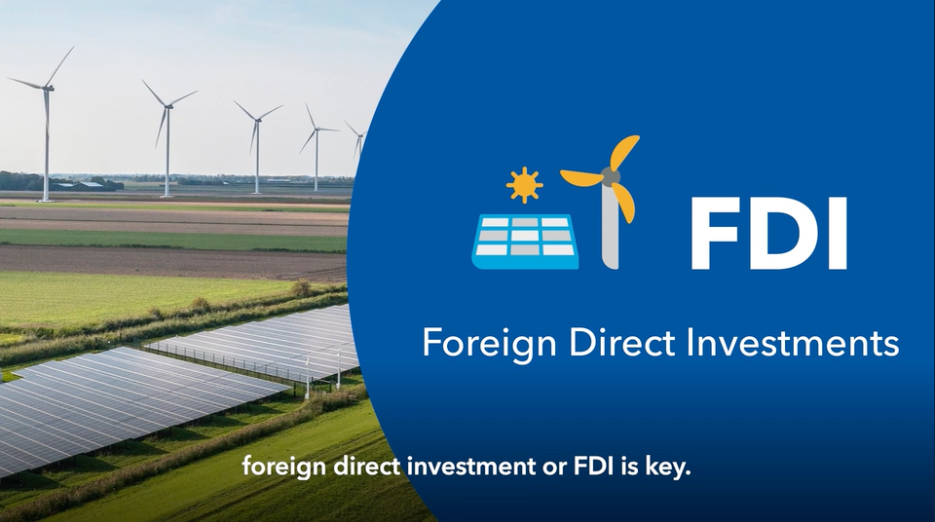IMF AT COP29

The IMF is sharing a pavilion at COP29 this year with the World Bank Group and the Financial Times to create opportunities for dialogue and knowledge sharing. The IMF will continue to promote economic and financial sector policies that can help our members and the wider international community reach shared climate goals such as reducing emissions, increasing climate finance, boosting resilience, and easing the transition to low-carbon economies.
November 12, 2024
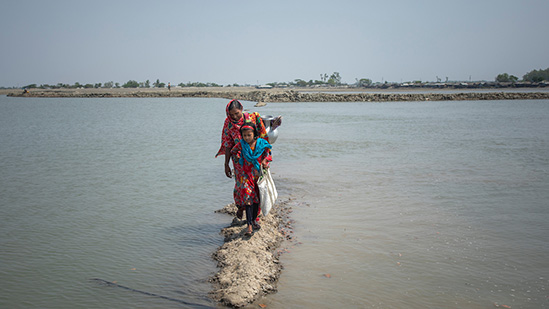
This Critical Decade: A Wake-up Call for Global Climate Action
10:00 AM - 10:45 AM (GMT+4)
Urgent action to cut greenhouse gas (GHG) emissions is needed now. Early next year, all countries will set new emissions targets for 2035 while revising their 2030 targets. Substantial gaps in global ambition and implementation still remain, with current levels of Nationally Determined Contributions only reducing global emissions by one quarter of what’s needed. Further delay will lead to an “emissions cliff edge,” implying implausible cuts in GHGs after 2030 and putting the target of 1.5°C beyond reach. This session assesses the question: Is the world on track to net zero? Building on updated IMF research, it will explore how to equitably close the global gap in climate ambition to achieve the Paris Agreement goals.
Watch eventPanelists
Ruud de Mooij
Deputy Director, Fisal Affairs Department, IMF
Ana Toni
National Secretary of Climate Change, Brazil
Tinne Van der Straeten
Minister of Energy, Belgium
Moderator: Will Kennedy, Senior Executive Editor for Energy and Commodities, Bloomberg
Essential reading

The Role for the Bretton Woods Institutions in Climate Action
5:00 PM - 5:45 PM (GMT+4)
This year marks the 80th anniversary of the creation of the Bretton Woods institutions and offers a moment to reflect on current and future global challenges. No challenge is bigger than the climate crisis. The World Bank group and the IMF are already taking unprecedented measures to mobilize their resources and expertise to address it. This session will feature a range of perspectives on what is working, how to scale those efforts up and what else can be done over the next few critical decades.
Watch eventPanelists
Mark Malloch Brown
Former Deputy Secretary-General, United Nations
Andrew Steer
President and CEO, Bezos Earth Fund
Helen Mountford
President & CEO, ClimateWorks Foundation
Amal-Lee Amin
Managing Director and Head of Climate, Diversity and Advisory, British International Investment
Moderator: James Astill, Deputy Director, Communications, IMF
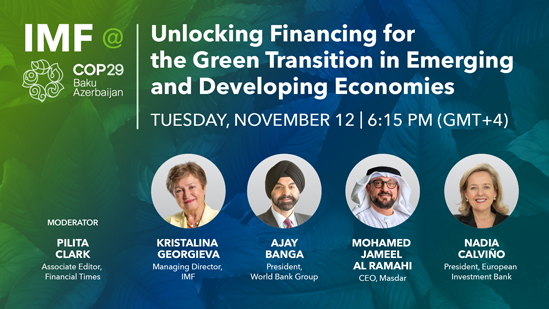
Unlocking Financing for the Green Transition in Emerging and Developing Economies
6:15 PM - 7:00 PM (GMT+4)
Delivering on global climate goals requires a shift to renewable energy and other green technologies. The main challenge for developing economies is securing funding for this transition. With limited fiscal space and low financial development, foreign direct investment (FDI) and official lending are crucial. Based on recent IMF staff publications, a high-level panel will discuss market reforms and financial sector policies to attract official financing, the impact of climate policies on FDI in low-carbon technologies, and the conditions needed to attract it. Panelists will also explore how domestic policies can enhance government revenue to support renewable energy. Additionally, they will consider how Just Energy Transition Partnerships, public-private partnerships, blended finance structures, and international cooperation can catalyze financing for renewable energy investments.
Watch eventPanelists
Kristalina Georgieva
Managing Director, IMF
Ajay Banga
President, World Bank Group
Mohamed Jameel Al Ramahi
CEO, Masdar
Nadia Calviño
President, European Investment Bank
Moderator: Pilita Clark, Associate Editor, Financial Times
Essential reading
- Policies to Foster Green FDI: Best Practices for Emerging Market and Developing Economies
- Harnessing Renewables in Sub-Saharan Africa: Barriers, Reforms, and Economic Prospects
- Financial Sector Policies to Unlock Private Climate Finance in Emerging Market and Developing Economies, Chapter 3, October 2023 Global Financial Stability Report (GFSR)
November 14, 2024

Destination Net Zero: The Urgent Need for a Global Carbon Tax on Aviation and Shipping
4:00 PM - 4:45 PM (GMT+4)
The need to decarbonize international transportation has long been overlooked. Aviation and shipping account for a rapidly growing share of global carbon dioxide emissions. This session will explore global mitigation policies for the sectors, notably a carbon tax and other pricing instruments like feebates, which could kick-start the sectors’ transitions towards net zero while generating substantial revenue for climate finance. The event, based on IMF’s recent analysis, will address practical policy options, their implementation, and the allocation of revenues from pricing to drive meaningful change in these hard-to-abate sectors.
Watch eventPanelists
Ruud de Mooij
Deputy Director, Fiscal Affairs Department, IMF
Morten Bo Christiansen
Senior Vice President, Head of Decarbonization, A.P. Møller – Mærsk A/S
Marie Owens Thomsen
SVP Sustainability and Chief Economist, International Air Transport Association (IATA)
Tom Evans
Senior Associate, Global Solidarity Levies Task Force, European Climate Foundation (ECF)
Moderator: Pilita Clark, Associate Editor, Financial Times
Essential reading
November 15, 2024
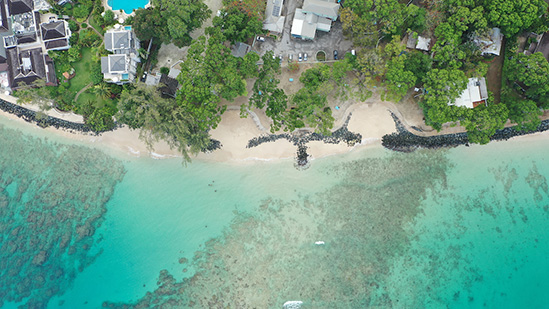
The Pioneering Role of IMF’s Resilience and Sustainability Trust (RST) in Climate Action
9:00 AM - 9:45 AM (GMT+4)
The IMF’s Resilience and Sustainability Trust was established in 2022 to help low-income and vulnerable middle-income member countries build resilience to external shocks. Its lending facility, the Resilience and Sustainability Facility (RSF), provides countries affordable longer-term financing to address enduring structural challenges, including from climate change and pandemics. To date, the Fund has approved 20 arrangements with total commitments of more than $9.5 billion. While most arrangements are still less than a year old, an early assessment of the RSF indicates a positive impact on the progression of reforms. In this event, panelists will discuss how specific countries benefited from the RSF and the lessons learned in the process, and will talk in more detail about policy reforms on climate adaptation and mitigation that are already bearing fruit.
Watch eventPanelists
Bo Li
Deputy Managing Director, IMF
Franz Tattenbach
Minister of Environment and Energy of Costa Rica
Samba Thiam
Ambassador and High-Level Coordinator for Mauritania’s RST Program
Moderator: Simon Jessop, Reuters
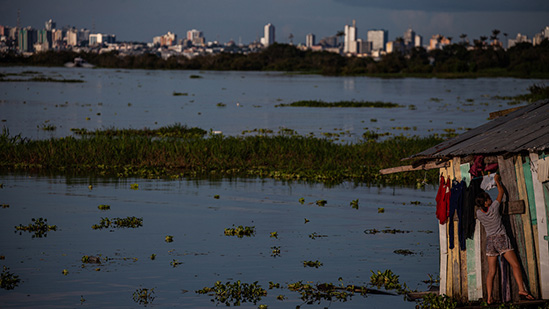
Bridging the Adaptation Financing Gap: Challenges and Potential Solutions
4:00 PM - 4:45 PM (GMT+4)
Managing the impact of climate change demands significant investment in climate resilience, especially in emerging markets and developing economies (EMDEs), which are disproportionately affected despite contributing the least to the problem. It is estimated that adaptation finance flows to these countries will need to significantly increase at a time when they already face the challenge of mobilizing funds for their development needs. Despite increasing awareness of the urgent need for adaptation action, financial resources to implement remain inadequate. In this session, the panelists will discuss how to enhance partnerships and cooperation to scale up adaptation financing for EMDEs and explore the role various stakeholders—including public institutions, private sector, and civil society—in attracting private capital for adaptation investments.
Watch eventPanelists
Bo Li
Deputy Managing Director, IMF
Rania Al Mashat
Minister of Planning, Egypt’s Ministry of Planning, Economic Development and International Cooperation
Tracy Kajumba
Director of the Least Developed Countries Initiative for Effective Adaptation and Resilience (LIFE-AR) at the International Institute for Environment and Development
Andrew Steer
President and CEO, Bezos Earth Fund
Moderator: Anca Gurzu, Chief Europe Correspondent, Cipher News
November 16, 2024

Measuring Climate Risks for Smarter Adaptation and Mitigation Solutions
10:00 AM - 10:45 AM (GMT+4)
As extreme weather events like floods, droughts, wildfires, and heatwaves become more frequent and severe and as transition risks associated with shifting to a low-carbon economy increase, it is crucial to understand their impact on people, infrastructure, financial markets, and economies. To create effective climate policies, we need timely and thorough risk assessments that look ahead. This joint session with the World Bank will focus on global efforts to build an internationally accepted framework for measuring both physical and transition risks of climate change. Panelists will discuss how these risk indicators can help assess countries' vulnerabilities and guide the development of stronger, more resilient policies and adaptation strategies.
Watch eventPanelists
Shahin Mahmuzade
Executive Director Central Bank, Azerbaijian
Jadwiga Massinga
National Director of Climate Change Ministry of Land and Environment, Mozambique
Stephane Hallegatte
Senior Climate Change Adviser, World Bank
Alessandra Alfieri
Assistant Director of Statistics Department, IMF
Moderator: Professor Matthew Agarwala, Bennett Chair in Sustainable Finance at the Bennett Institute for Innovation and Policy Acceleration, University of Sussex Business School
Why Women Risk Losing Out in Shift to Green Jobs
Closing the gender gap in science, technology, engineering, and math would accelerate the green transition while making it more inclusive
How Europe Can Make Carbon Pricing Policies Less Regressive
Easing the burden on lower-income households is not only socially fair, but also economically efficient
Economics Authors Confront Toughest Questions on Data, History, and Theory
New books offer fresh perspectives on climate, China, and John Maynard Keynes
The World is Sitting on a Razor's Edge
The world is sitting on a razor's edge, and the deciding factor between future prosperity and potential runaway climate disaster is a single number-- 1.5.
Unlocking Financing for the Green Transition in Emerging and Developing Economies
To hit net zero by 2050, emerging and developing countries will need substantial amounts of additional renewable energy investment--because domestic financial resources are limited, foreign direct investment, or FDI, is key.
IMF-IAIS High-Level Panel on Climate Change Protection Gaps and the Insurance Sector
The damage and economic losses generated by natural catastrophe events and climate change have risen significantly in frequency and scale in recent years.
Climate Voices: This Critical Decade — An Update on Global Mitigation Policy
Urgent action to cut greenhouse gas emissions is needed. Further delay will lead to an ‘emissions cliff edge’, putting 1.5°C target beyond reach.
Climate Voices: Green Jobs and the Future of Work for Women and Men
Promoting STEM education, especially for young women, is fundamental to speeding up the green transition and making it more inclusive.
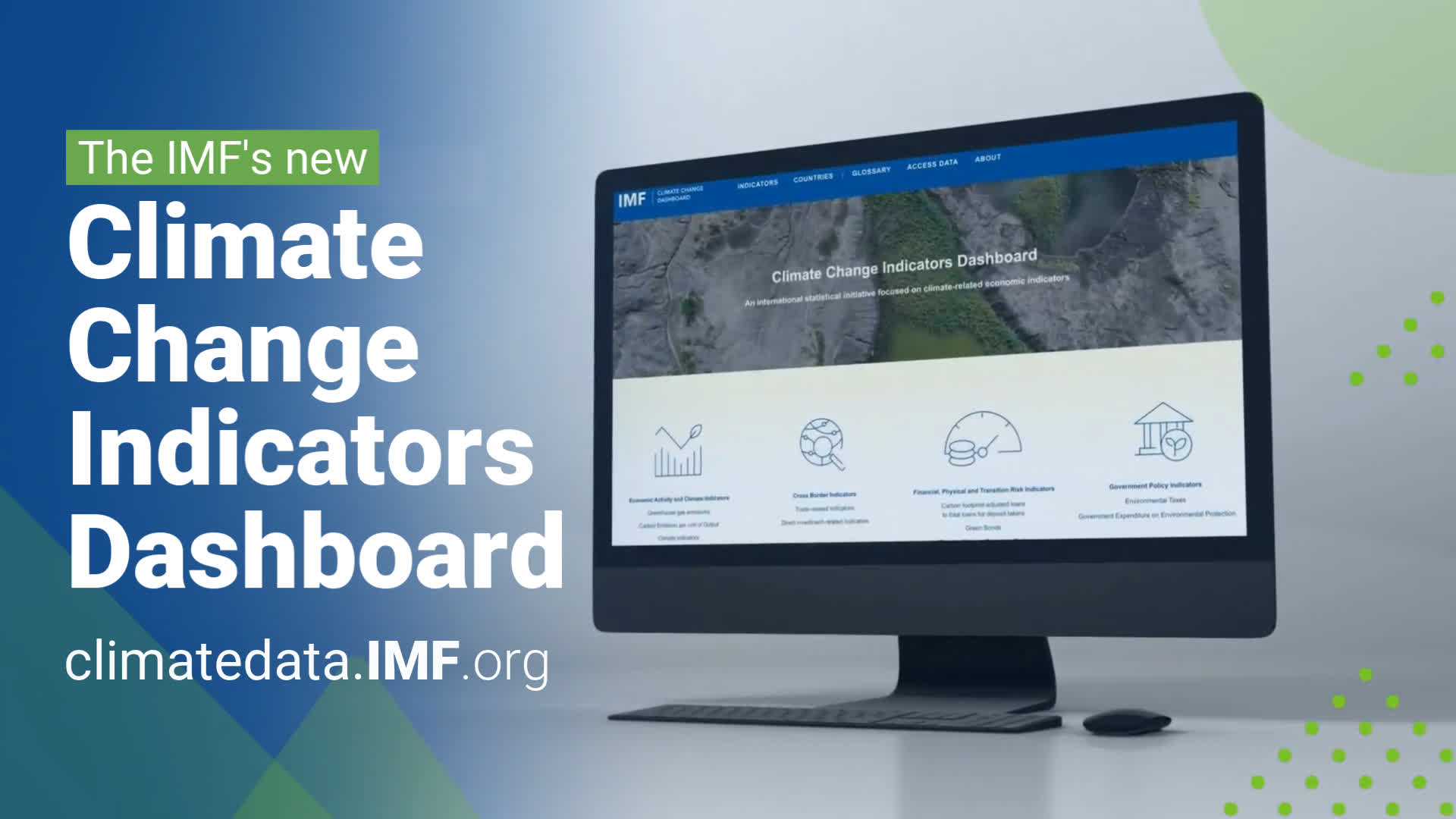
Climate Change Indicators Dashboard
The IMF's Climate Change Indicators Dashboard provides a platform for disseminating climate change data for macroeconomic and financial stability analysis. The dashboard helps users assess the linkage between economic and financial activities and government policies on the one hand, and climate change (and environment more broadly) on the other—either on a country-level or cross-country basis—by analyzing a standardized set of comparable data.







